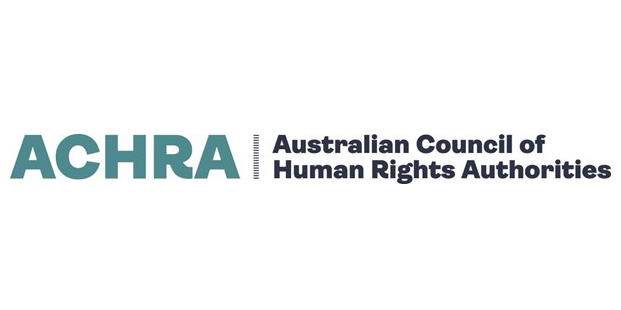
While in Canberra, ACHRA also met with Minister for Indigenous Australians, Senator Malarndirri McCarthy, Attorney-General Mark Dreyfus MP and the Parliamentary Joint Committee on Human Rights, chaired by Josh Burns MP.
The ACHRA members listed at the bottom of this document endorse the following statements:
ACHRA Charter
The Commissioners agreed to refresh the ACHRA Charter. To reflect the valuable role ACHRA can play as a national coalition, the charter was amended to allow adoption of decision by majority instead of unanimity. It was agreed that any dissenting view would be communicated at the same time as the majority position.
Data
ACHRA discussed the critical importance of consistent, public data in communicating the work of their Commissions and agreed to release an annual national data report covering the type of complaints received, who is making complaints, trends in complaint data and outcomes related to this work. In this context, ACHRA welcomed the federal government’s implementation of recommendation 25 of the Respect at Work report by amending the Australian Human Rights Commission (AHRC) legislation to reduce the risk of costs orders against people who take legal action about discrimination in federal courts. ACHRA noted that this initiative may impact the number of complaints received by the AHRC in comparison to state Commissions. ACHRA supported AHRC’s view that it would be important to measure complaints data to assess whether this impact eventuated. ACHRA also committed to working together to explore ways of collecting consistent data across jurisdictions.
National Human Rights Act
ACHRA welcomed the Parliamentary Joint Committee on Human Rights’ recent report on its Inquiry into Australia's Human Rights Framework and the report’s recommendation that the government establish a Human Rights Act. ACHRA reaffirmed its commitment to adoption of a national Human Rights Act.
National Anti-Racism Framework
ACHRA welcomed a presentation by Commissioner Sivaraman on the National Anti-Racism Framework and noted the primary piece will be building racial literacy, exploring how race operates in Australia and understanding how systems and structures work to entrench the racial status quo. The aim of the Framework is to be actionable, accountable and monitored to achieve change. ACHRA supports the National Anti-Racism Framework and endorsed Commissioner Sivaraman working with state and territory governments to use the Framework as a guide to combat racism.
Youth Justice
ACHRA welcomed National Children’s Commissioner Hollonds ‘Help way earlier!’ How Australia can transform child justice to improve safety and wellbeing report and emphasised the importance of implementing evidence-based approaches to youth justice issues. ACHRA supported Commissioner Hollonds recommendation that a National Taskforce be established to oversee progress on youth justice reform, supported by a 10-year national action plan.
Closing the Gap
ACHRA welcomed a presentation by Commissioner Siegel-Brown and Commissioner Button from the Productivity Commission on their review of the National Agreement on Closing the Gap. ACHRA expressed concern over the gap between rhetoric and action in implementing the National Agreement. ACHRA noted the importance of priority 3 of the National Agreement, to transform government organisations so they work better for Aboriginal and Torres Strait Islander peoples, as well as the important role of data for measuring implementation and outcomes, including for justice reinvestment initiatives. ACHRA endorsed the review’s recommendation that independent mechanisms be established to monitor and evaluate governments’ implementation of and compliance with the National Agreement.
Funding
ACHRA welcomed recent legislative reforms across federal, state and territory jurisdictions that resulted in stronger protections against discrimination, sexual harassment and vilification, however noted the importance of appropriate funding to ensure that new legislation was appropriately operationalised and communicated. Funding disparity more generally was also raised as a major concern with some ACHRA members facing significant funding challenges.
Positive Duty Working Group
ACHRA agreed to establish an officers-level working group to facilitate collaboration between members at the federal and state and territory level regarding positive duty obligations. ACHRA endorsed the working group’s proposed terms of reference.
For further information, contact the following ACHRA members:
ACT Dr Pene Mathew, President and Human Rights Commissioner 02 6205 2222
NSW Helen McKenzie, President, Anti-Discrimination NSW
Mia Zahra, Executive Manager, Anti-Discrimination NSW 02 9268 5514
NT Jeswynn Yogaratnam 08 8999 1444
QLD Scott McDougall (ACHRA Chair), Queensland Human Rights Commissioner 07 3021 9123
SA Jodeen Carney, South Australian Equal Opportunity Commissioner 08 7322 7764
TAS Sarah Bolt, Tasmanian Anti-Discrimination Commissioner 03 6165 7515
VIC Ro Allen, Victorian Equal Opportunity and Human Rights Commissioner 1300 292 153
WA Dr John Byrne AM, Commissioner for Equal Opportunity 08 9216 3955
AHRC Leanne Smith, Chief Executive 02 9284 9740


